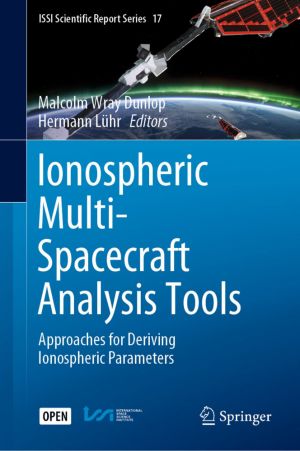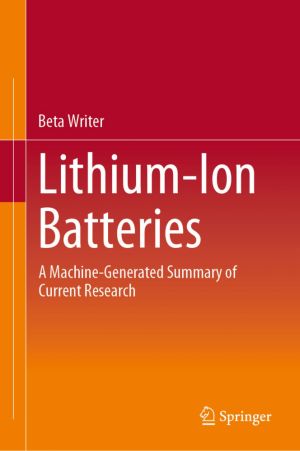Lithium-Ion Batteries
A Machine-Generated Summary of Current Research
by Beta Writer
DescriptionDetailsHashtagsReport an issue 






Book Description
This is the first machine-generated scientific book in chemistry published by Springer Nature. Serving as an innovative prototype defining the current status of the technology, it also provides an overview about the latest trends of lithium-ion batteries research.This book explores future ways of informing researchers and professionals. State-of-the-art computer algorithms were applied to: select relevant sources from Springer Nature publications, arrange these in a topical order, and provide succinct summaries of these articles. The result is a cross-corpora auto-summarization of current texts, organized by means of a similarity-based clustering routine in coherent chapters and sections.This book summarizes more than 150 research articles published from 2016 to 2018 and provides an informative and concise overview of recent research into anode and cathode materials as well as further aspects such as separators, polymer electrolytes, thermal behavior and modelling.With this prototype, Springer Nature has begun an innovative journey to explore the field of machine-generated content and to find answers to the manifold questions on this fascinating topic. Therefore it was intentionally decided not to manually polish or copy-edit any of the texts so as to highlight the current status and remaining boundaries of machine-generated content.Our goal is to initiate a broad discussion, together with the research community and domain experts, about the future opportunities, challenges and limitations of this technology.This open book is licensed under a Creative Commons License (CC BY). You can download Lithium-Ion Batteries ebook for free in PDF format (4.6 MB).
Book Details
Title
Lithium-Ion Batteries
Subject
Science and Mathematics
Publisher
Springer
Published
2019
Pages
278
Edition
1
Language
English
ISBN13
9783030167998
ISBN10
3030167992
ISBN13 Digital
9783030168001
ISBN10 Digital
303016800X
PDF Size
4.6 MB
License

Related Books

This book provides students and practicing engineers with a comprehensive guide to off-grid electrification: from microgrids and energy kiosks to solar home systems and solar lanterns. As the off-grid electrification industry grows, universities are starting and expanding courses and programs in humanitarian engineering and appropriate technology. ...

This book shows how the study of multi-hadron production phenomena in the years after the founding of CERN culminated in Hagedorn's pioneering idea of limiting temperature, leading on to the discovery of the quark-gluon plasma -- announced, in February 2000 at CERN.Following the foreword by Herwig Schopper -- the Director General (1981-1988) o...

This book provides a comprehensive toolbox of analysis techniques forionospheric multi-satellite missions. The immediate need for this volume was motivatedby the ongoing ESA Swarm satellite mission, but the tools that are described are generaland can be used for any future ionospheric multi-satellite mission with comparableinstrumentation.
In addi...

Flow of ions through voltage gated channels can be represented theoretically using stochastic differential equations where the gating mechanism is represented by a Markov model. The flow through a channel can be manipulated using various drugs, and the effect of a given drug can be reflected by changing the Markov model. These lecture notes provide...

Ionic 4 takes the original Ionic toolkit from a mobile-centric framework based on Angular to a powerful, web-based UI design system and app-development toolset that is JavaScript-framework agnostic. The increased performance of Ionic 4 components makes the framework ideal for developing progressive web apps (PWAs), which are in high demand and popu...

The Ionic framework is an open-source SDK built on top of Angular, integrating with Apache Cordova, and programmed using mostly Typescript and the JSON data format. It is used to build cross-platform mobile apps and Progressive Web Apps with ease, using familiar web technologies like HTML, JavaScript, and CSS. In Ionic Succinctly, Ed Freitas takes ...

